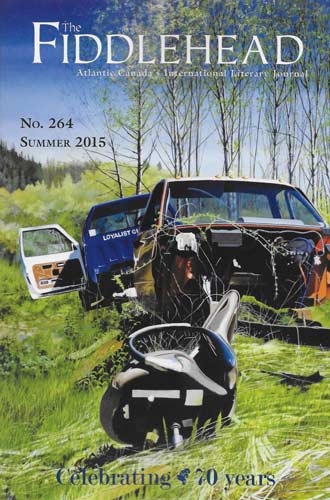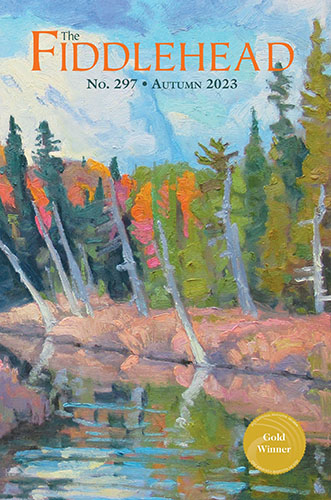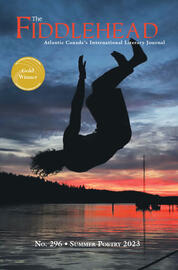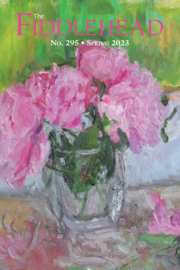The Fiddlehead – Summer 2015
The Fiddlehead has been publishing for 70 years. That is no small feat. The extreme quality of this summer fiction issue exudes wisdom, diversity, and a sophistication that younger publishers need to experience to fully apprehend. All too often, literary journals feel slap-dab, thrown together, off-the cuff—the antithesis of Fiddlehead. As Editor Mark Anthony Jarman modestly states in his foreword: “No one else in Canada can touch what we are doing now.” Although I am not a fan of braggarts, I have to agree. This selection of 14 short stories takes the reader around the world; from a pearl shop in Tahiti to a bar in Barcelona. The Fiddlehead has been publishing for 70 years. That is no small feat. The extreme quality of this summer fiction issue exudes wisdom, diversity, and a sophistication that younger publishers need to experience to fully apprehend. All too often, literary journals feel slap-dab, thrown together, off-the cuff—the antithesis of Fiddlehead. As Editor Mark Anthony Jarman modestly states in his foreword: “No one else in Canada can touch what we are doing now.” Although I am not a fan of braggarts, I have to agree. This selection of 14 short stories takes the reader around the world; from a pearl shop in Tahiti to a bar in Barcelona. The reader follows a repo-man in the Cape Breton Highlands and glimpses into a marriage fighting cancer and aging in a British Columbia island home. We are guests at a South East Asian wedding and witness a patricide by pipe to the skull in the Ozark Mountains. There is a style and story to engross the spectrum of readers. For the more critically minded, Fiddlehead finalizes the summer issue with 15 pages of reviews.
Daniel Woodrell, the author of Winter’s Bone, a Zell fellowship winner from Missouri, kicks-off with an intimate portrait of a violent community in “Johanna Strull, 3/11/88, Blond, Brown.” The title refers to the drivers licenses that the protagonist’s father collects after brutally raping and beating his victims. Although the story has two extremely violent moments, the artistry lies in showing the perpetrators as multi-dimensional-characters. The son of the rapist tries to care for the victim and takes revenge:
There’s a heavy pipe in the junk pile that fits my hand. He’s squatting by the gleaming tire, banging that hammer, my rough cob-daddy, and I stepped closer to his bent back, hefted the pipe. One good whack and his head opened and dropped him to the dirt, and I stood back to keep my boots clean. He wiggled on the dirt quite a bit and dumped. Running blood making me inch backwards. His stink came and went like a shit ball the wind kicked.
Woodrell’s descriptions are exacting and poetic. Even in the most gruesome of details, the narration is connected to location and character, while pushing the plot to a just and forgiving end.
“Seachange,” a short story about a middle-class, middle-aged couple on holiday in Tahiti, by Alice Peterson, winner of the Quebec Writers’ First Book Prize for her collection All the Voices Cry, could not be more different in style and tone. The main scene is set in a pearl shop where Felicity, a librarian, after a day snorkeling and visiting a pineapple plantation, realizes she cannot afford what her heart desires. Years and years of marriage are summed up in this tiny non-transaction. The magic of the exotic location juxtaposed with the tourists on a budget, conjures up universal questions about materialism versus experience, passion versus comfort, security versus adventure. In a tender moment near the conclusion, Felicity’s husband Gerald presents her with a bottle cap, a tiny symbol of love. Not an heirloom pearl, but his heart is still hers:
Gerald did not say that she could flatten them and hang them in her ears. He was kind in that way too. And another thing, well it must happen all the time, that tourists pass through Moorea with enough money to stay, but not to spend.
“Seachange” is subtle and sweet and insightfully sides with the endurance of marriage when faced with the temptation of carpe diem.
In “Going to Mackenzie,” D.R. MacDonald pilots the reader into a tiny farmstead on remote land in Cape Breton, Nova Scotia. The few settlers speak Gaelic and have not left the community for generations. The first-person narrator is young and doing a dirty job for the government that plans to build a National Park. But through some backdoor dealings, more likely a golf course and condominiums will be built on the untouched land. Mackenzie, the evictee, has a sick wife, no money and had never lived anywhere else. “I guess he hoped her death might alter the fate of the property, somehow soften the government I stood for. But I told him. Your land was already lost when I showed up here. I’m just a functionary.” The story hinges on doing a job you know is wrong, but having to do it anyway. It turns a touch magical at the end, which glimmers with sinister hope.
I was highly impressed with the range and quality of Fiddlehead’s selections. I would love to go through and summarize each individual story here, but I suggest you go find a copy yourself and read every page. It is easy to understand how they have been publishing for 75 years, and I would wager they will for 75 more.
[www.thefiddlehead.ca]





